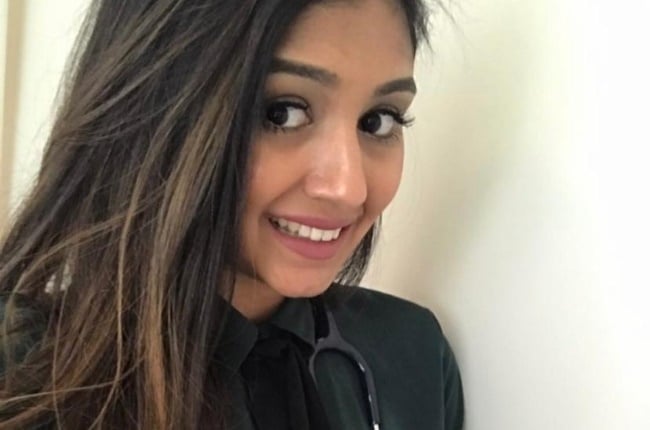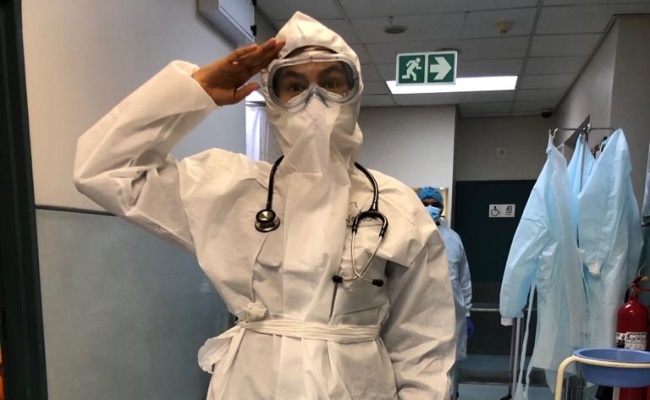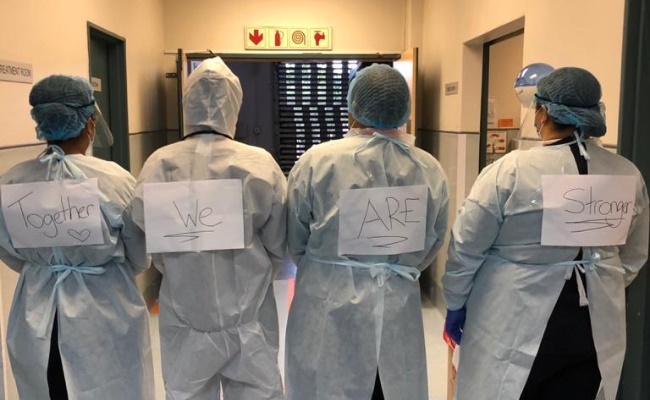
When the Western Cape hurtled towards its peak in the number of Covid- 19 cases, emergency workers battled around the clock to treat the ill, the terrified and the desperate.
Dr Karienya Kasvalu (33) works in the emergency unit of a private hospital in Cape Town’s northern suburbs. This is her story.
The hours, days and weeks have all blurred into one. I often don’t recognise my colleagues dressed in their layers of protective clothing and masks as they rush from one patient to the next.
And then there’s the look in the eyes of patients battling for every breath. It’s more than just fear. They’re too tired to cry. They’re not angry. They show no emotion – it’s a completely empty look. I think it’s because they have to focus so hard on breathing.
When I get home to my flat, I’m physically and emotionally drained but I can’t relax until I’ve gone through my ritual. I take off my shoes at the front door. I immediately put my clothes in the wash, then I take a hot shower. But nothing I do makes me feel completely safe from the virus.
Thankfully I wear several layers of protective clothing at the hospital and my hair’s always covered too. But some days, even though it’s not on a day I’d usually wash my hair, I’ll wash it anyway because I feel I may have been exposed during the day.
After my shower, I spray the door handle and the washing machine lid with an alcohol sanitiser because I touched them when I came in.
Right now, I’ve just come off a 12-hour night shift. I had ‘lunch’ just after 3am so I’m not really aware of time anymore.
We work under immense pressure. I can’t even describe it. And every single hospital is the same – state hospitals, private hospitals, all of us.
The infection rate is rising daily and we’re in the thick of it. Right now, there’s no sign of the pandemic abating.
When the national lockdown started in late March, the emergency unit went dead quiet and we were all like, “Yes!”
The night shifts were going well, the days too.
Suddenly, there was time to have coffee with a colleague or have a chat in the hallway. And it was all because people couldn’t buy alcohol, travel to work or visit friends.
The roads were empty and the result was a drastic reduction in trauma cases.
We didn’t have many fractures, bullet or knife wounds. I asked my colleagues, “Where are the heart attacks? The strokes?” People also stopped coming to the ER with minor ailments – those who’d come for any itch, scratch or runny nose.
That’s how it went for the first nine weeks of lockdown. It was actually quite peaceful – but it turned out to be the calm before the storm.
As soon as lockdown rules were eased under level 3, stabbings and car accidents increased. And simultaneously, the number of Covid-19 patients started increasing.
Before someone is admitted to hospital for whatever reason, they’re tested for coronavirus. And everyone started testing positive. Many of the people who came to hospital for other reasons were asymptomatic.
The condition of many Covid-19 patients with initial mild symptoms deteriorated within a week. These are people who went home but then came back to us sicker than before. And they’re young people – between 36 and 48.
The doctors in the ER are the hospital’s foot soldiers. We’re the first point of contact for anything – walk-ins, ambulances, even the people who end up going to a specialist.
Because of the pandemic, the entire hospital has been divided into colour- coded zones: red for the sickest Covid-19 patients; orange to indicate that you’re approaching a red zone; and green for patients who tested negative.
Protective clothing and equipment including masks, gloves and plastic visors are worn in each zone, with a full hazmat suit required if you’re working in the red zone.
Each time we take off a piece of protective gear, we must sanitise our hands. It’s a never-ending ritual as we move between zones but we practise it religiously because it’s how everyone stays safe.
But it’s surreal – like a scene from a movie like Fever War or Contagion. Sometimes someone in a hazmat suit greets me and if I know them well, I’ll recognise them by their eyes.
But the other day, when we had to resuscitate someone, my five colleagues were just marshmallows in space suits. I didn’t know who I was working with. It feels like you’re in an alien environment.
We also have a PUI ward – it stands for “persons under investigation”. These are patients who were admitted for various conditions but their Covid-19 status is unknown. They stay there until we know. And when we know, we send them to the appropriate colour zone.
Increasingly, patients are sent to the red zone. That’s the danger zone.
It’s an ongoing struggle finding enough beds for everyone, so patients are often transferred to other hospitals. And a Covid-19 patient’s condition can rapidly deteriorate from stable to critical.
The fact that many hospital staff members are contracting the virus is making things worse. The other night I worked late, helping the matron call around to find beds in other hospitals, because our nursing staff is overwhelmed.
About 50 of our staff members are sick with the coronavirus. So even if we have open beds, we don’t have the staff to take care of everyone.
People keep asking if we can get more ventilators. But who’s going to care for the patient on the ventilator? You need a qualified registered nurse for that.
I had to spend two weeks in self- isolation in my flat after coming into contact with someone with Covid-19 not long ago. The quarantine overlapped with three weeks of leave I’d taken to visit my family in Durban. I haven’t seen them since February.
But instead of travelling, I spent 14 days alone in my flat with only my pet rabbit, Flos, for company. Friends brought me food and toiletries. Luckily, my test results came back negative.
I don’t know when I’ll see my family again but I speak to my mom often. My dad died when I was small and I’m very much her support – financially too.
The thought that something could happen to me terrifies her.
I find the uncertainty of it all emotionally exhausting. But I speak to my friends and also to a therapist often to manage the stress.
When we put someone on a ventilator, we don’t know if they’ll survive. And when a patient arrives at the hospital with shortness of breath, they’re rushed inside – they barely have time to say goodbye to their family. For some, it’s the last time they’ll see their loved ones.
I try to comfort the bewildered patients and their families but it’s hard when all they can see is your eyes. I try using all the words possible to reassure them.
Every day is different, so I just take things one shift at a time. One day we’ll talk about life after Covid-19 but that will be a different story and it will probably be a while before we do.




 Publications
Publications
 Partners
Partners



















